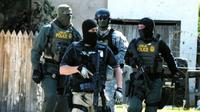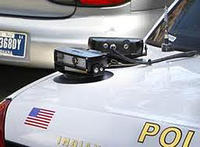-
NSA revelations hobble pursuit of a comprehensive cyberdefense initiative
NSA director General Keith Alexander has proposed a digital version of Ronald Reagan’s space-based Star Wars missile defense program, which Reagan unveiled in 1983. In Alexander’s vision, when a cyberattack is launched at the United States, the defense system would intercept and thwart the attack before it caused any damage. Intercepting a cyberattack would require the NSA to tap, track, and scan all cyber traffic entering the United States. The technology needed to intercept cyberattacks, however, is strikingly similar to the technology the NSA uses for the types of surveillance Snowden exposed. Post-Snowden, it is doubtful that the administration would pursue a comprehensive cyberdefense initiative, or that lawmakers would accept it.
-
-
DEA uses NSA surveillance information to make arrests

The Drug Enforcement Administration (DEA) has benefitted from multiple tips from the National Security Administration’s (NSA) surveillance programs – although not necessarily the programs revealed by Edward Snowden. DEA officials in a secret office known as the Special Operations Division (SOD) are assigned to handle incoming tips from the NSA. The information exchanged between the two agencies includes intelligence intercepts, wiretaps, informants, and a massive database of telephone records.
-
-
The FBI uses hackers’ methods in its surveillance programs
The U.S. government is planning to expand its suspect surveillance programs to include tactics which are commonly used by computer hackers.The FBI typically uses hacking in cases involving organized crime, child pornography, or counterterrorism, a former U.S. official said. The agency is less inclined to use these tools when investigating hackers, out of fear the suspect will discover and publicize the technique.
-
-
Russia grants Snowden a 1-year temporary refugee status (updated)

Edward Snowden has left Moscow’s Sheremetyevo airport and has entered Russia after he had been granted temporary asylum – the official language: a temporary refugee status — for one year. U.S. lawmakers said Russia’s decision had damaged U.S.-Russian relations. “Russia has stabbed us in the back,” said Senator Charles Schumer (D-New York). “Each day that Mr. Snowden is allowed to roam free is another twist of the knife.” The White House said the United States was “extremely disappointed that the Russian government would take this step,” a step which “undermines a long-standing record of law enforcement cooperation.
-
-
NSA director faces tough crowd at Black Hat conference

The National Security Agency (NSA) director General Keith Alexander was met with some applause but mostly skepticism – and even boos — when he spoke during a Black Hat conference in Las Vegas earlier this week. Alexander said that there are only twenty-two people who work at the NSA who can approve the surveillance of a specific phone number, and thirty-five analysts who can review the inquiries.
-
-
Russia grants Snowden a 1-year temporary refugee status
Edward Snowden has left Moscow’s Sheremetyevo airport and has entered Russia after he had been granted temporary asylum – the official language: a temporary refugee status — for one year. It is not yet known whether Snowden’s plan is to stay in Russia permanently, or whether he will try to move on to one of the four Latin American countries — Venezuela, Bolivia, Nicaragua, and Ecuador – which last month had offered him asylum. U.S. lawmakers said Russia’s decision had damaged U.S.-Russian relations, and the White House hinted that President Obama may cancel a planned summit meeting with Putin in Moscow in September.
-
-
U.S. Appeals Court: govt. does not need search warrant to track cellphones

Law enforcement agencies have won a victory Tuesday when a federal appeals court ruled that government authorities could extract historical location data directly from telecommunications carriers without a search warrant. The ruling by the U.S. Court of Appeals for the Fifth Circuit is the first ruling directly to address the constitutionality of warrantless searches of historical location data stored by cellphone service providers. He appeals court said that historical location data is a business record which is the property of the cellphone provider. The appeals court also said that the collection of such data by authorities does not have to meet a probable cause standard as outlined under the Fourth Amendment, which protects against unlawful search and seizure and requires a search warrant.
-
-
Two Chicago terrorism cases bring the issue of expanded surveillance to the fore
A Chicago attorney representing a teenager facing terrorism charges raised concerns during a pre-trial hearing about whether expanded surveillance methods were used in her client’s case. This is the second time in less than a month that the issue of expanded surveillance methods was brought up in a Chicago terrorism case.
-
-
Manning found guilty of violating the Espionage Act, acquitted of aiding the enemy (updated)

A military judge earlier this afternoon (Tuesday) found Private Manning Pfc. Bradley Manning guilty of more than twenty counts of violating the Espionage Act. The judge, Army Col. Denise Lind, found Manning not guilty of aiding the enemy. Manning admitted to being to source of the massive leaks of U.S. government documents and videos, leaks which came to be called WikiLeaks. In all, Manning has leaked more than 700,000 documents. The sentencing phase will begin Wednesday. The conviction for violating several aspects of the Espionage Act, and for stealing government property, could lead to punishment of up to 136 years in prison.
-
-
Manning found guilty of violating the Espionage Act, acquitted of aiding the enemy
A military judge earlier this afternoon (Tuesday) found Private Manning Pfc. Bradley Manning guilty of more than twenty counts of violating the Espionage Act. The judge, Army Col. Denise Lind, found Manning not guilty of aiding the enemy. Manning admitted to being to source of the massive leaks of U.S. government documents and videos, leaks which came to be called WikiLeaks. In all, Manning has leaked more than 700,000 documents. The sentencing phase will begin Wednesday. Violating several aspects of the Espionage Act could lead to punishment of up to 100 years in prison.
-
-
Deeply divided House rejects effort to curb NSA data collection program
In an exceedingly close vote — 205-to-217 — a bitterly divided House of Representative on Wednesday rejected legislation proposed to block the National Security Agency (NSA) from continuing its metadata collection programs. The debate over the balance between security and privacy – and whether, indeed, the NSA surveillance programs threatened privacy — saw the formation of an unusual coalition of liberal Democrats and libertarian and tea party Republicans calling for curbing the NSA surveillance power.
-
-
Details of al Qaeda’s “next generation” bomb, aborted effort to take out its designer, emerge
Al Qaeda engineers have been working on designing a sophisticated bomb powerful enough to bring down passenger planes but which is designed to avoid detection by explosives detection machines or trained dogs at airports. “All of our explosive detection equipment wasn’t calibrated to detect [this type of bomb]” TSA director John Pistole said. “And all of our 800 bomb-sniffing dogs had not been trained for that specific type.” A CIA informant inside a Yemeni cell of al Qaeda volunteered to place the bomb on a U.S.-bound plane, but instead delivered it to his CIA handlers in Saudi Arabia. A CIA effort to learn more about the bomb maker, Ibrahim Hassan Asiri, and take him out was aborted when someone leaked the story to AP. The news service refused pleas by the administration to postpone publication of the story until the end of the operation. The AP did agree to delay publication by a week to ten days to allow the CIA to extricate the agent and his family from Saudi Arabia to safety before publication. Asiri and his bomb-making assistants are still at large.
-
-
Angry lawmakers warn NSA to curb surveillance operations
John Inglis, the deputy director of the National Security Agency (NSA), told angry lawmakers yesterday that his agency’s ability to analyze phone records and online behavior is greater than what the agency had previously revealed. Inglis told members of the House Judiciary Committee that NSA analysts can perform “a second or third hop query” through its collections of telephone data and Internet records in order to find connections to terrorist organizations. Representative James Sensenbrenner (R-Wisconsin), the author of the 2001 Patriot Act, warned the intelligence officials testifying before the committee that unless they rein in the scope of their surveillance on Americans’ phone records, “There are not the votes in the House of Representatives” to renew the provision after its 2015 expiration. “You’re going to lose it entirely,” he said.
-
-
Automatic license plate readers used to collect, store data on millions of Americans

Automatic license plate readers are the most widespread location tracking technology available to law enforcement. Mounted on patrol cars or stationary objects like bridges, they snap photos of every passing car, recording their plate numbers, times, and locations. At first the captured plate data was used just to check against lists of cars law enforcement hoped to locate for various reasons (to act on arrest warrants, find stolen cars, etc.). Increasingly, however, all of this data is being fed into massive databases that contain the location information of many millions of innocent Americans stretching back for months or even years.
-
-
CIA copied, employed “Q”-developed 007 outlandish gadgets

The real-life CIA copied and employed a few outlandish gadgets from James Bond movies. The CIA was successful copying Rosa Klebb’s infamous spring-loaded poison knife shoe from the film From Russia with Love, but was less successful trying to copy the homing beacon device used in Goldfinger to track the villain’s car. The CIA version had “too many bugs in it,” former CIA director Allen Dulles would later say, and stopped working when the enemy entered a crowded city.
-
- All
- Regional
- Water
- Biometrics
- Borders/Immig
- Business
- Cybersecurity
- Detection
- Disasters
- Government
- Infrastructure
- International
- Public health
- Public Safety
- Communication interoperabillity
- Emergency services
- Emergency medical services
- Fire
- First response
- IEDs
- Law Enforcement
- Law Enforcement Technology
- Military technology
- Nonlethal weapons
- Nuclear weapons
- Personal protection equipment
- Police
- Notification /alert systems
- Situational awareness
- Weapons systems
- Sci-Tech
- Sector Reports
- Surveillance
- Transportation
Advertising & Marketing: advertise@newswirepubs.com
Editorial: editor@newswirepubs.com
General: info@newswirepubs.com
2010-2011 © News Wire Publications, LLC News Wire Publications, LLC
220 Old Country Road | Suite 200 | Mineola | New York | 11501
Permissions and Policies
Editorial: editor@newswirepubs.com
General: info@newswirepubs.com
2010-2011 © News Wire Publications, LLC News Wire Publications, LLC
220 Old Country Road | Suite 200 | Mineola | New York | 11501
Permissions and Policies
